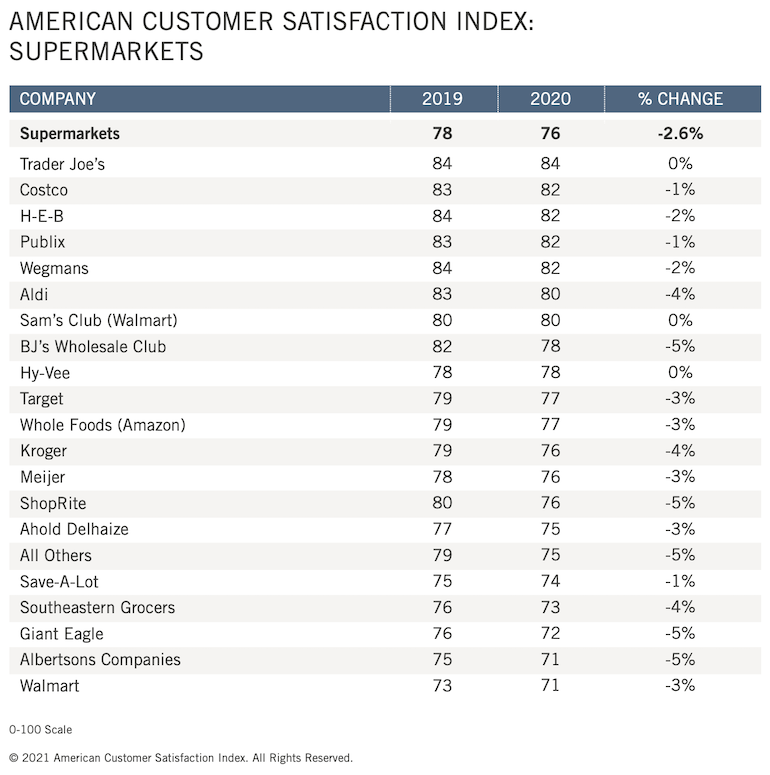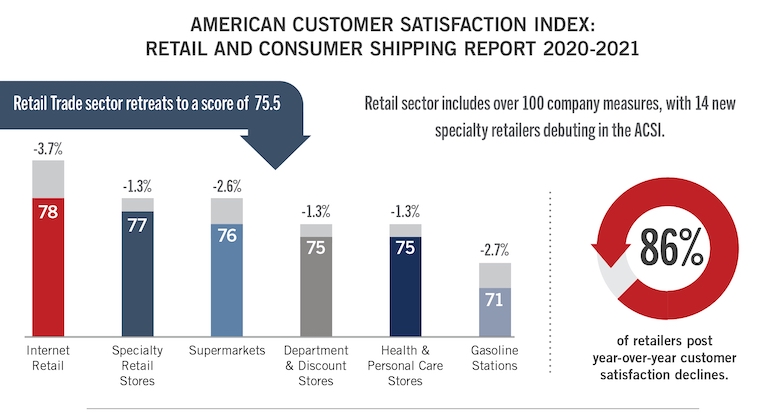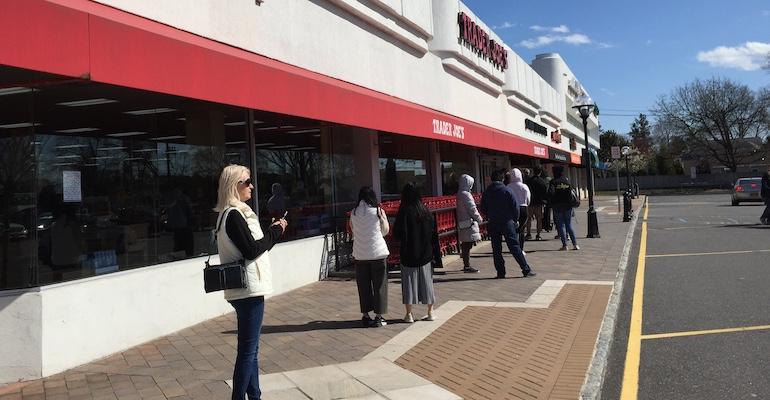With stores of all stripes disrupted by the COVID-19 pandemic, supermarkets and other retailers saw customer satisfaction shrink in 2020, with the retail sector falling to its lowest score since 2015, according to the American Customer Satisfaction Index (ACSI).
The ACSI Retail and Consumer Shipping Report 2020-2021, released this week, is based on interviews with 70,767 U.S. consumers. Retailers are rated by a score of 0 to 100 according to a range of customer service criteria, such as store location and hours, staff courtesy and helpfulness, store layout and cleanliness, merchandise availability, product quality, checkout speed and frequency of sales and promotions.
Overall, the retail industry scored 75.5 out of 100 for 2020. Ann Arbor, Mich.-based ACSI noted that of the six retail segments covered — supermarkets, health and personal care stores, department and discount stores, specialty retail stores, online retail and gas stations — all experienced decreased customer satisfaction last year.

“2020 sent waves of disruption across the retail sector,” according to David VanAmburg, managing director at the ACSI. “From mandatory closures that halted in-person shopping to stock shortages caused by panic buying, retailers experienced anything but business as usual. Deliveries from online retailers were delayed, and customers were frustrated when high-demand items sold out. And it shows, as 86% of the retailers measured suffered downturns in customer satisfaction year over year.”
After four years of near-stable customer satisfaction, supermarkets experienced a 2.6% drop in their ACSI score to 76 in 2020 from 78 in 2019, as 17 of the 20 major grocers covered posted lower scores.
Trader Joe’s led the supermarket sector — and the retail industry overall — with a customer satisfaction score of 84, the same as in 2019. Next were four retailers with a score of 82: Costco Wholesale (83 in 2019), H-E-B (84 in 2019), Publix Super Markets (83 in 2019) and Wegmans Food Markets (84 in 2019).
“The areas where Trader Joe’s does particularly well show no signs of strain. The company continues to knock it out of the park for staff courtesy and helpfulness, and its checkout speed stays best in class,” ACSI said in the report. “Four companies tie for second place with scores of 82 that also place them ahead of all other retailers in the sector. Costco, H-E-B, Publix and Wegmans display stronger levels of customer satisfaction and less satisfaction erosion than most chains in 2020. Among these stores, Publix ticks off the most wins across the customer experience, including store cleanliness and layout.”
Rounding out the top 10 grocery retailers in customer satisfaction for 2020 were Aldi at 80 (83 in 2019), Sam’s Club at 80 (same as in 2019), BJ’s Wholesale Club at 78 (82 in 2019), Hy-Vee at 78 (same as in 2019), and Target and Whole Foods Market at 77 (both scored 79 in 2019).
“Prior to the pandemic, many traditional grocers were already moving into the online grocery space, facing stiff competition from Amazon and Walmart. Post-COVID-19, online shopping, pickup and delivery all gained popularity,” ACSI observed. “Still, many shoppers continue to patronize physical stores, even during the pandemic.
“With the onset of COVID-19, consumer shopping patterns morphed almost overnight. In some cases, grocers encountered declines in store visits, but average transaction sizes grew,” the report said. “Panic buying caused shortages of household items like hand sanitizer and toilet paper. In grocery carts, nonperishable staples took over as consumers stocked pantries. As shelves emptied, shoppers took notice. ACSI data show that customer opinions about merchandise availability take the biggest hit in 2020. Overall, shoppers find less to be happy about across the entire range of supermarket customer experience elements.”

The nation’s largest supermarket operator, The Kroger Co., finished in the middle of the pack in customer satisfaction with an ACSI score of 76, down from 79 in 2019. Walmart, the largest U.S. grocery retailer, came in at the bottom with a 71 score (versus 73 in 2019). The nation’s second-largest supermarket retailer, Albertsons Cos., tied Walmart with a score of 71 but saw one of the steepest declines, down four points from 75 in 2019. Also experiencing four-point score decreases were BJ’s, ShopRite (to 76 from 80) and Giant Eagle (to 72 from 76).
“Among the traditional retail categories, the supermarket customer experience is hurting the most. Every aspect is less pleasing than a year ago, and eight out of 13 customer experience elements worsen by 4% or more. The industry’s top ratings are convenience of hours and locations (both 81). Most other elements slide below the excellent level of 80 and above seen in 2019,” according to ACSI.
Out-of-stocks, lower fresh food quality and fewer sales promotions — all tied to supply issues — were leading sticking points with customers. Consumers surveyed also reported declined satisfaction with personal service grocery staff, supermarket mobile apps and in-store pharmacy services.
“Store layout and cleanliness suffers, as does the freshness of meat and produce (both -4% to 79). Brand names are scarcer (-2% to 79) and merchandise selection is less robust (-3% to 78),” ACSI said. “Merchandise availability, or lack thereof, is even more irksome to customers (-5% to 76). Sales and promotions fail to hit the mark as well (-4% to 76).”

Unsurprisingly, online retailers earned the top customer-satisfaction score in 2020 at 78 (-2 points from 2019), followed by specialty retail stores at 77 (-1 from 2019), supermarkets at 76 (-2 from 2019), department and discount stores at 75 (-1 from 2019), and health and personal care stores at 75 (-1 from 2019). Also rated in the study were gas stations and consumer shipping providers, with scores of 71 and 76, respectively.
The top finishers in other store categories were Costco (81), Nordstrom (80), and Dillard’s and Sam’s Club (both 79) for department and discount stores; CVS (77), Kroger (76) and Walgreens (74) for health and personal care stores; L Brands (81), Hobby Lobby (80), and Nike and Sephora (both 80) for specialty stores; and Nordstrom (81) and Costco, Etsy and Newegg (all 80) for online retailers.





